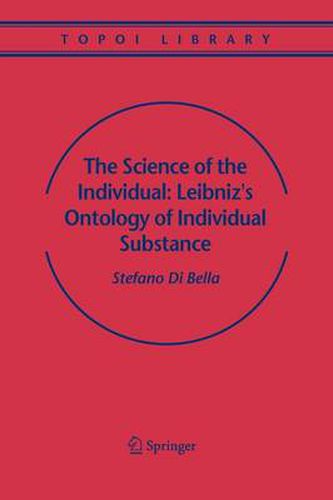Readings Newsletter
Become a Readings Member to make your shopping experience even easier.
Sign in or sign up for free!
You’re not far away from qualifying for FREE standard shipping within Australia
You’ve qualified for FREE standard shipping within Australia
The cart is loading…






This title is printed to order. This book may have been self-published. If so, we cannot guarantee the quality of the content. In the main most books will have gone through the editing process however some may not. We therefore suggest that you be aware of this before ordering this book. If in doubt check either the author or publisher’s details as we are unable to accept any returns unless they are faulty. Please contact us if you have any questions.
In his well-known Discourse on Metaphysics, Leibniz puts individual substance at the basis of metaphysical building. In so doing, he connects himself to a venerable tradition. His theory of individual concept, however, breaks with another idea of the same tradition, that no account of the individual as such can be given. Contrary to what has been commonly accepted, Leibniz’s intuitions are not the mere result of the transcription of subject-predicate logic, nor of the uncritical persistence of some old metaphysical assumptions. They grow, instead, from an unprejudiced inquiry about our basic ontological framework, where logic of truth, linguistic analysis, and phenomenological experience of the mind’s life are tightly interwoven. Leibniz’s struggle for a concept capable of grasping concrete individuals as such is pursued in an age of great paradigm changes – from the Scholastic background to Hobbes’s nominalism to the Cartesian ‘way of ideas’ or Spinoza’s substance metaphysics – when the relationships among words, ideas and things are intensively discussed and wholly reshaped. This is the context where the genesis and significance of Leibniz’s theory of ‘complete being’ and its concept are reconstrued. The result is a fresh look at some of the most perplexing issues in Leibniz scholarship, like his ideas about individual identity and the thesis that all its properties are essential to an individual. The questions Leibniz faces, and to which his theory of individual substance aims to answer, are yet, to a large extent, those of contemporary metaphysics: how to trace a categorial framework? How to distinguish concrete and abstract items? What is the metaphysical basis of linguistic predication? How is trans-temporal sameness assured? How to make sense of essential attributions? In this ontological framework Leibniz’s further questions about the destiny of human individuals and their history are spelt out. Maybe his answers also have something to tell us. This book is aimed at all who are interested in Leibniz’s philosophy, history of early modern philosophy and metaphysical issues in their historical development.
$9.00 standard shipping within Australia
FREE standard shipping within Australia for orders over $100.00
Express & International shipping calculated at checkout
This title is printed to order. This book may have been self-published. If so, we cannot guarantee the quality of the content. In the main most books will have gone through the editing process however some may not. We therefore suggest that you be aware of this before ordering this book. If in doubt check either the author or publisher’s details as we are unable to accept any returns unless they are faulty. Please contact us if you have any questions.
In his well-known Discourse on Metaphysics, Leibniz puts individual substance at the basis of metaphysical building. In so doing, he connects himself to a venerable tradition. His theory of individual concept, however, breaks with another idea of the same tradition, that no account of the individual as such can be given. Contrary to what has been commonly accepted, Leibniz’s intuitions are not the mere result of the transcription of subject-predicate logic, nor of the uncritical persistence of some old metaphysical assumptions. They grow, instead, from an unprejudiced inquiry about our basic ontological framework, where logic of truth, linguistic analysis, and phenomenological experience of the mind’s life are tightly interwoven. Leibniz’s struggle for a concept capable of grasping concrete individuals as such is pursued in an age of great paradigm changes – from the Scholastic background to Hobbes’s nominalism to the Cartesian ‘way of ideas’ or Spinoza’s substance metaphysics – when the relationships among words, ideas and things are intensively discussed and wholly reshaped. This is the context where the genesis and significance of Leibniz’s theory of ‘complete being’ and its concept are reconstrued. The result is a fresh look at some of the most perplexing issues in Leibniz scholarship, like his ideas about individual identity and the thesis that all its properties are essential to an individual. The questions Leibniz faces, and to which his theory of individual substance aims to answer, are yet, to a large extent, those of contemporary metaphysics: how to trace a categorial framework? How to distinguish concrete and abstract items? What is the metaphysical basis of linguistic predication? How is trans-temporal sameness assured? How to make sense of essential attributions? In this ontological framework Leibniz’s further questions about the destiny of human individuals and their history are spelt out. Maybe his answers also have something to tell us. This book is aimed at all who are interested in Leibniz’s philosophy, history of early modern philosophy and metaphysical issues in their historical development.